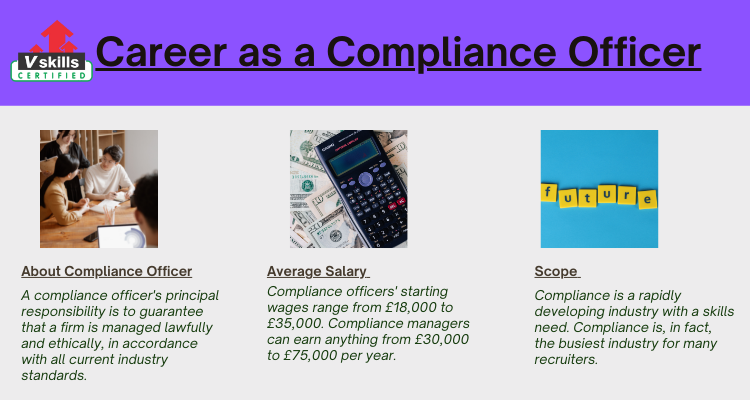A compliance officer’s principal responsibility is to guarantee that a firm is managed lawfully and ethically, in accordance with all current industry standards. This job responsibility begins with a thorough examination of existing rules and ethical standards in a certain sector.
Let us know about Career as a Compliance Officer!
About Compliance Officer
As a compliance officer, you’re in charge of ensuring that a firm follows all external regulatory obligations as well as internal regulations. In other words, you’re in charge of ensuring sure your boss follows the regulations. Financial sector companies, in particular, have considerably increased the size of their risk and compliance teams in response to new requirements since the global economic collapse. Many of the top tier banks were hit with billions of pounds in fines, forcing them to expand their staff in order to stay compliant.
Roles and Responsibilities
They must possess advanced oral and written communication skills. Also, employers prefer such professionals who are highly-analytical and have strong attention to detail. As a Certified Compliance Officer your responsibilities include:
- Firstly, they should develop, implement and manage an effective legal compliance program
- Then, they should develop sound internal controls and monitor adherence to them
- Further, they advise management on the company’s compliance with laws and regulations through detailed reports.
- Also, regularly audit company procedures, practices, and documents to identify possible weaknesses or risk.
- Moreover, create plans to manage a crisis or compliance violation
- Additionally, they should Ensure all employees are educated on the latest regulations and processes
- Finally, they should be up to date with the latest internal standards and business goals
Eligibility
People who work in compliance don’t usually have a certain set of skills. Qualifications are becoming more relevant as compliance becomes more crucial and the Financial Conduct Authority (FCA) becomes more involved. Compliance isn’t a field that cares about where you went to school or what you studied. However, number-based degrees (such as economics), commercial degrees (such as business studies), and legal degrees are preferred in general, but don’t let this deter you; many organizations are flexible and will take any degree field.
There are a variety of courses available, but companies value those offered by the International Compliance Association (ICA). Employers like law degrees as well as accounting degrees. Keep in mind that compliance is a broad field, and various positions within compliance will search for people with a variety of experiences.
Career Prospects
Due to the increased focus on compliance, opportunities to advance your career in compliance have been rising for many years. Since the global economic crisis, the position of a compliance officer has been seen as a promising one, owing to the numerous chances it offers across a variety of sectors. Many junior compliance officers advance quickly, and within two to four years, they are promoted to senior officers. Compliance managers have an average of more than five years of experience, while senior management has an average of more than 10 years of experience.
If you opt to work for a major corporation, your career path will most likely be linear, with you progressing from analyst to associate vice president to vice president. Smaller businesses may employ more common terms such as manager and senior manager. These are two industries where there is huge scope of career advancement –
Finance Industry – The financial industry is a ripe field for those interested in a compliance-related career. The compliance department of a bank, brokerage or investment management firm works to ensure that all of the employees and officers comply not only with Securities and Exchange Commission (SEC) regulations but also Financial Industry Regulatory Authority (FINRA) rules.
Public Sector – Even though state and local public sector compliance jobs generally come with lower starting salaries than their private sector counterparts, benefits, and job security are far better. Even states with relatively low public benefits, such as Colorado and Minnesota, significantly outpace average benefits packages with the best private employers. It’s also difficult to get fired from a public sector job, essentially adding a form of unemployment insurance. So, while applying for a public sector job can be cumbersome, it is still a good option for those interested in compliance.
Your compliance position may differ depending on which of the following specialties you pursue:
- assurance
- financial crime
- monitoring
- product advisory
- regulatory affairs
- trade surveillance
Average Salary
The industry in which you work has a significant impact on your pay; for example, compliance officers in banks are paid more than compliance officers in charities. Salary ranges are –
- Compliance officers’ starting wages range from £18,000 to £35,000.
- Compliance managers can earn anything from £30,000 to £75,000 per year.
- Senior compliance managers may make up to, and sometimes more than, £100,000 per year.
Roles that are available on a contract or temporary basis may also be worth investigating. Compliance professionals with less than two years of experience may expect to pay £200 per day.
Scope
Compliance is a rapidly developing industry with a skills need. Compliance is, in fact, the busiest industry for many recruiters. This is good news for graduates who want to work in the compliance field. Unlike law or medicine, compliance does not have a set of requirements for job experience and certifications, therefore identifying your transferrable talents is typically the priority. There are several specific graduate programs available, notably in financial services. Some risk management graduate positions may involve compliance responsibilities, and many bank rotating graduate programs include a compliance placement.
Resources offered by Vskills for Compliance Officer
Vskills offer Compliance Officer certification for all those interested in working in this field or in advancing their career. This certification course covers various objectives –
- Business Ethics and Values
- Ethical Theories
- Personal Values
- Values and Heuristics
- Individual Responses
- Role of Corporates
- Sustainability
- Ethics and Law
- Ethics and IT
- Other Ethics
- Business Conduct and Ethics Sample
Vskills also offers free practice tests and online tutorials to supplement the learning process. You can check them by clicking on the following links –
Other Resources for Compliance Officer
Before you can become an expert in desired areas, you must first build a solid base. Before you can move on to practical teaching, you’ll need to have the right applied skills. To gain better understanding of the domain, you can use the following tools:
- Firstly, Online Tutorials for being Compliance Officer
- Also, Certification Courses from verified sources such as Vskills, Coursera, Udemy and so on.
- In addition, Online communities
- Moreover, Blogs and study material from experts in this field and many more.
Here are some examples of how you can improve your abilities:
- Freelancing
- Internships
- Apprenticeship programs
The above steps will help you to get this domain started. It’s a long way to go, however. You can take an advanced course to reach a new level of skills.
Discover the career opportunities and other prospects of Career as Compliance Officer. Hurry up and start preparing now with Vskills.in!




